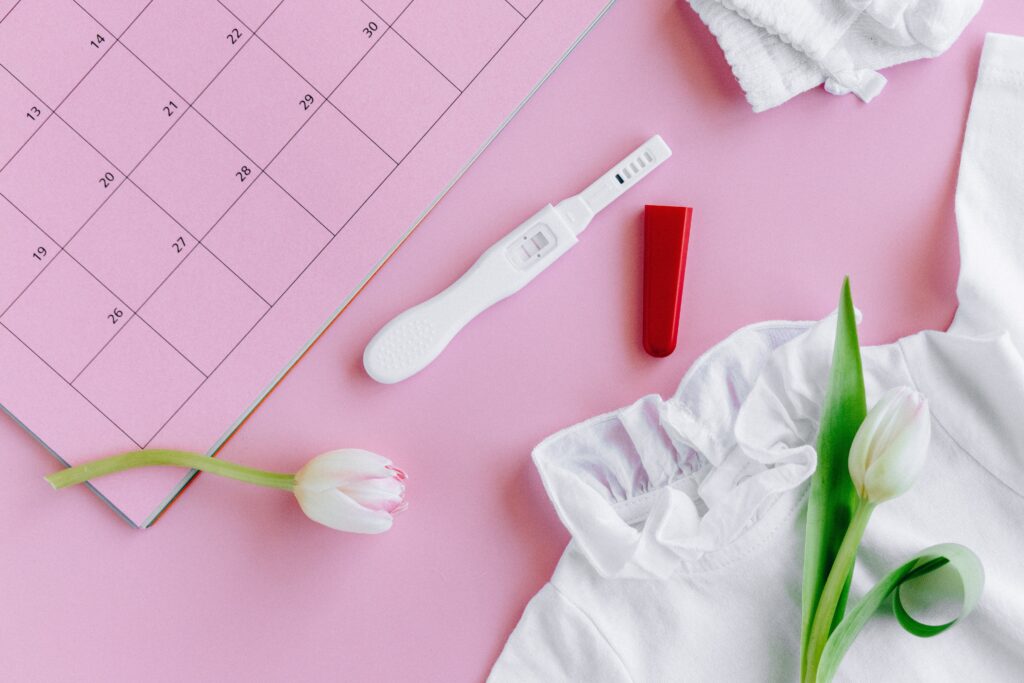
Progesterone is a master hormone when it comes to getting pregnant. Without it, ovulation isn’t happening – meaning pregnancy is not possible. And with levels that are lower than ideal, healthy embryo implantation and the ability to carry your pregnancy to term is compromised. Because of its importance, many women are looking for ways to increase progesterone naturally. It’s very possible to increase progesterone without medication, or even to supplement your progesterone medication with natural hacks. Think of it this way: Your low progesterone is not a result of a medication deficiency but a lifestyle imbalance. With the right lifestyle interventions your progesterone levels can increase within a matter of months. Read on for ten ways to naturally increase progesterone levels without medication from a functional hormone coach.
1. Increase Your Vitamin C Intake
Vitamin C naturally stimulates progesterone production before ovulation, and women who get enough Vitamin C through their diet or supplements have significantly higher progesterone levels. While a supplement is an easy way to get more Vitamin C, you can also eat foods rich in Vitamin C daily such as berries, citrus fruit, leafy greens, broccoli, bell pepper, cauliflower, and Brussels sprouts.
2. Get Enough Magnesium
Magnesium is a common micronutrient deficiency among American women, and low magnesium levels impact many body systems including sex hormones. Try including more dark chocolate, pumpkin seeds, almonds, quinoa, leafy greens, and fish in your diet, and consider supplementing with 200-400 mg of magnesium daily. Pro tip: Magnesium glycinate is a parasympathetic activator that can help you feel more relaxed and get deeper sleep when taken before bed, and if you struggle with constipation, magnesium citrate taken before bed can help with regular morning bowel movements.
3. Eat More B6 Foods
Vitamin B6 is critical for the development of the corpus luteum, which develops after your egg is released and is responsible for progesterone production. Include more avocado, salmon, chicken, beef, eggs, liver, leafy greens, and bananas in your regular diet.
4. Change Your Views on Dietary Fat & Cholesterol
In modern America, dietary fat is still a dirty word and cholesterol is something we’ve been taught to avoid at all costs. However, all of our steroid hormones, including progesterone, require fat and cholesterol to be made! Include healthy fat with every meal and snack, such as avocado, fatty fish, nuts, seeds, ghee, grassfed butter, grassfed cheeses and whole milk yogurts, coconut oil, and olive oil. And remember that cholesterol is only found in animal fats, so if you’re vegetarian or vegan and you’re female you may not be getting enough. Opt for quality animal foods like pastured eggs, grassfed red meats, and wild caught fatty fish like salmon and if you’re not getting regular cycles make sure you don’t have low total cholesterol or LDL levels.
5. Eat More Zinc Foods
Zinc helps increase FSH which facilitates ovulation, however many of us are deficient and don’t know it. To get more zinc consider eating red meat two to three times per week, adding 2 tablespoons of pumpkin seeds daily to your salads, yogurt bowls, or trail mix, and eating more seafood, especially oysters, sardines, crab, and salmon.
6. Create Balance With Your Exercise Routine
Many of us have been taught that more exercise is better and harder is best. That’s simply not true for our fertility health! Intense cardio like HIIT classes as well as long duration cardio like half marathon training are physical stressors that increase cortisol. Cortisol and progesterone share the same parent hormone, pregnenolone, so any increased demand for cortisol can negatively impact progesterone levels. Instead of going all out five days per week, aim to balance moderate intensity cardio workouts with restorative exercise like yoga, strength training, pilates, and outdoor walks, and take at least one rest day per week.
7. Reduce Xenoestrogens Exposure
Xenoestrogens are chemicals that mimic and interfere with estrogen in your body, and they can throw off the delicate balance of estrogen and progesterone. Women experience many problems including suboptimal fertility when progesterone is unable to keep estrogen in check. For many of us the largest exposure comes from plastic food storage containers and water bottles, nonstick cookware, conventional beauty and skincare products, and conventional cleaning products.
8. Keep Your Caffeine Intake In Check
Remember that cortisol-progesterone link we talked about earlier? Unfortunately caffeine increases cortisol and can negatively impact progesterone production. This is especially important if you’re naturally anxious or under a lot of stress! Try reducing coffee intake to one 8-10 ounce cup per day maximum. Avoid all energy drinks and think about swapping the coffee for green tea or matcha. Caffeinated teas (green, white, and black) all contain l-theanine, a naturally soothing amino acid that can help counteract caffeine’s effect on your adrenals.
9. Manage Emotional and Mental Stressors
Notice how I didn’t say reduce stress? That’s because I also live in the modern world and I know how difficult it is to live a low stress life. While getting rid of toxic stressors is always a great idea, it’s just as important to cultivate positive coping mechanisms for stress and anxiety. This will help you better manage and release your stress on a regular basis.
10. Stop Intermittent Fasting and Going Too Long Between Meals
This one is nuanced as some form of time restricted eating can be helpful for women with insulin resistant PCOS. However, prolonged fasting does more harm than good for many women with low progesterone. That’s because fasting is a physical stressor on your body, and can increase cortisol and shut down sex hormone production over time. I recommend a 12-hour break between dinner and breakfast rather than the 16+ hour fasts many health experts advise. Then eat a meal or snack every 3-4 hours throughout the day.
Balancing hormones and increasing progesterone naturally is a speciality of mine. If you’re worried about your progesterone or want to enhance the medication your doctor prescribed with natural lifestyle hacks, you’re in the right place. Book your complimentary 30-minute Discover Call with me here to troubleshoot your challenges and outline your path to fertility wellness.
